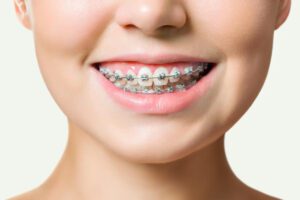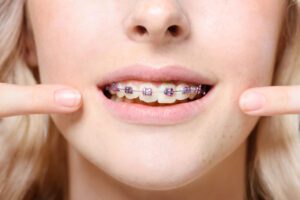Posted on October 24, 2023

Wearing braces can have a significant impact on the social and emotional well-being of both teens and adults. Have you ever wondered how this orthodontic treatment can affect your self-confidence, relationships, and overall mental health?
Fortunately, there are coping strategies that can help navigate these challenges and make the braces journey a more positive experience.
For many individuals, the decision to get braces is not just about improving dental health but also about achieving a beautiful and aligned smile. However, the process of wearing braces can be daunting, as it often involves uncomfortable adjustments, changes in appearance, and potential social judgment.
Recognizing the potential social and emotional impact of wearing braces is crucial in order to develop effective coping strategies.
This post from Smilebliss will explore the various challenges faced by both teens and adults who wear braces and provide valuable tips on how to navigate these difficulties while maintaining a positive outlook and overall well-being.
By implementing these strategies, individuals can make their orthodontic journey a smoother and more rewarding experience.
Getting orthodontic braces is a significant step towards achieving a beautiful and aligned smile. However, it is not uncommon for individuals to experience various emotional reactions when they first get their braces.
Understanding these common emotional reactions can help individuals better navigate their orthodontic journey and ultimately embrace their new braces with confidence.
Getting braces often elicits excitement and anticipation. Many people are thrilled about the idea of having straighter teeth and better oral health. This excitement comes from knowing that braces will bring long-term benefits like increased self-confidence and a more attractive smile.
On the flip side, anxiety and self-consciousness are also common emotional reactions to getting braces. It is completely natural to feel apprehensive about how others may perceive you with braces. Some individuals worry about feeling different or being judged by their peers.
Initially, braces may cause soreness and ulcers as the mouth adjusts to the foreign objects. This discomfort can lead to feelings of frustration and impatience. However, it is important to remember that this is only temporary and that the discomfort will subside over time.
Orthodontic treatment can be a lengthy process, often spanning several months or even years. As a result, it is common for individuals to experience impatience and frustration. It is understandable to want immediate results, but it is important to remember that orthodontic treatment requires time to achieve the desired outcome.
 The visible presence of braces often leads to self-consciousness and reduced confidence, particularly during the initial stages of wearing them.
The visible presence of braces often leads to self-consciousness and reduced confidence, particularly during the initial stages of wearing them.
For teenagers, this can be especially challenging as they are already navigating the complex social dynamics of adolescence.
Being teased or feeling different because of braces can affect their willingness to socialize and participate in activities.
Similarly, adults may also experience feelings of self-consciousness, which can impact their interactions in professional and social settings.
Navigating social interactions while wearing braces can sometimes add an extra layer of complexity to our relationships.
Whether it’s embracing confidence in romantic ties, maintaining comfort levels in friendships, or managing daily life with family, the journey through orthodontic adjustments is more than just physical.
It’s about keeping connections strong and healthy, despite the self-consciousness or challenges that might come with braces.
Whether you are a teenager or an adult undergoing orthodontic brace treatment, here are some tips to help you cope with discomfort and pain.
Over-the-counter pain relievers like ibuprofen or acetaminophen can help alleviate the discomfort and pain associated with orthodontic brace treatment. Always follow the recommended dosage and consult your orthodontist if you have any concerns or questions.
Orthodontic braces can sometimes cause irritation and sores in the mouth. To minimize this discomfort, your orthodontist will provide you with a special wax that you can apply to the brackets or wires. The wax acts as a barrier between your braces and the inside of your mouth, reducing friction and irritation.
A saltwater rinse can help reduce inflammation and promote healing if you experience any mouth sores or ulcers caused by braces. Mix half a teaspoon of salt in a glass of warm water, and swish the solution around your mouth for 30 seconds before spitting it out. Repeat this a few times a day, especially after meals.
During the initial days of getting braces or after adjustments, your teeth may feel sore and uncomfortable. It is best to stick to soft foods such as mashed potatoes, yogurt, smoothies, and soups. Avoid hard, crunchy, or sticky foods that can further irritate your braces and prolong the discomfort.
Maintaining good oral hygiene is crucial during orthodontic brace treatment. Cleanliness can help prevent any additional discomfort or pain caused by irritation or infections. Brush your teeth thoroughly, including around the wires and brackets, after each meal. Use interdental brushes or floss threaders to clean between your teeth and braces.
Regularly visiting your orthodontist for adjustments and check-ups is important to ensure the treatment progresses smoothly. During these visits, you can discuss any concerns or discomfort you may be experiencing, and your orthodontist can make necessary adjustments to alleviate pain and improve your comfort level.
To overcome anxiety and fear during orthodontic brace treatment as a teenager or adult, it is important to remember that it is a common and temporary treatment that can greatly improve your oral health and self-confidence.
Here are some steps to help overcome anxiety and fear:
 Research and understand the process of orthodontic treatment, including the purpose of braces and the expected results.
Research and understand the process of orthodontic treatment, including the purpose of braces and the expected results.
Knowing what to expect can alleviate anxiety and fear of the unknown.
Openly discuss your concerns, anxiety, and fears with your orthodontist. They are professionals trained to guide and support you throughout the treatment process.
They can explain each step and address any specific concerns you may have.
Talk to friends or family members who have undergone orthodontic treatment with braces. Hearing about their positive experiences can help ease your anxiety. You can also join online forums or support groups to connect with individuals going through similar experiences.
Practice relaxation techniques, such as deep breathing exercises or meditation, to manage anxiety during orthodontic appointments. Distracting yourself with music, podcasts, or audiobooks during treatment can also help redirect your focus.
Acknowledge and reward yourself for each milestone achieved throughout your orthodontic treatment. This can be something as simple as treating yourself to a small reward or sharing your progress with friends and family.
Focus on the end result—a beautiful and healthy smile. Visualization exercises can help reduce anxiety and fear by imagining yourself with a confident smile after the orthodontic treatment is complete.
Stepping into your braces journey is a transformative experience, both aesthetically and personally. At Smilebliss, we recognize that this pivotal phase is about more than straightening teeth; it’s about bolstering self-esteem and ensuring comfort in one’s skin.
Our dedicated team doesn’t just adjust smiles; we provide a nurturing, supportive environment where confidence flourishes. From the moment you embark on this journey with us, you’ll feel understood, cared for, and reassured through every step of your orthodontic adventure.
Utilizing cutting-edge technology coupled with compassionate care, Smilebliss stands out as the premier choice for those seeking not just a beautiful smile but a seamless, anxiety-free experience.
Your path to a radiant, confident smile is a shared journey, and Smilebliss is committed to making it memorable, comfortable, and empowering. Contact us today for more details!